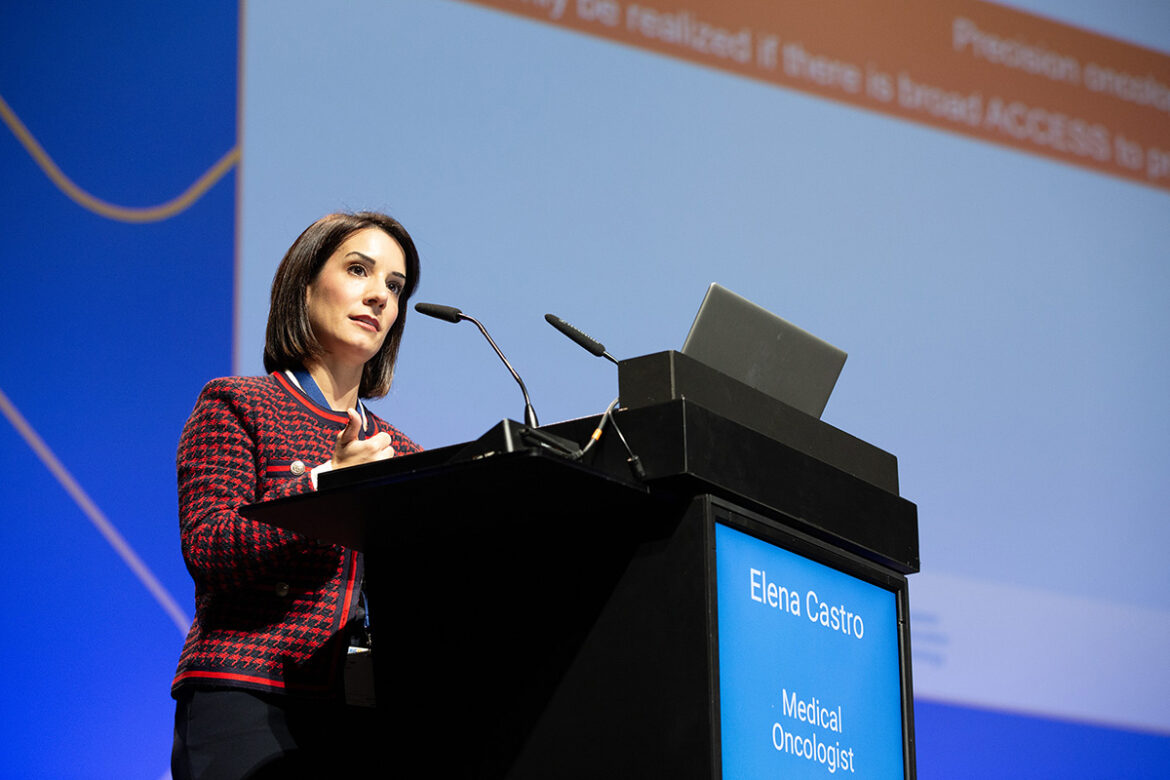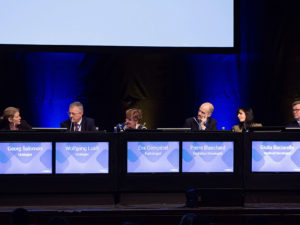The second half of Plenary Session 13 “New standards and novel approaches in advanced prostate cancer” was spearheaded by radiotherapist Prof. Valerie Fonteyne (BE), urologist Dr. Wolfgang Loidl (AT), Prof. Daniela Oprea-Lager (NL), and medical oncologist Dr. Ursula Vogl (CH).
During his presentation, “Lu-PSMA in mCRPC men not taxane pre-treated”, Dr. Andrea Farolfi (IT) emphasised that prostate-specific membrane antigen (PSMA)-targeted radioligand therapy (RLT) is gaining momentum globally. He added that new trials on PSMA RLT are coming soon.
Overall survival (OS) was not the primary point for both PSMAfore (phase 3) and ENZA-p (phase 2) trials. PSMAfore had a “weak” control arm (i.e.ARPI [androgen receptor pathway inhibitor] switch), while ENZA-p had an active control arm (i.e. SoC vs. SoC + Lu-PSMA-617).
PSMAfore had a cross-over allowed by trial design. There is proof of peer documentation of activity (e.g. cancer regression, delay progression) in taxane-naïve patients with PSMA-positive metastatic castration-resistant prostate cancer (mCRPC). In addition, Lu-PSMA-617 has a manageable safe profile and was well-tolerated. The trial provides data for use prior to docetaxel in patients with mCRPC.
In ENZA-p, there is evidence of enhanced anticancer activity on PSA-PFS (prostate-specific antigen-progression-free survival) in a well-chosen sub-population. Furthermore, the adaptive dosed Lu-PSMA-617 will provide data on toxicity and the correct dosage for each patient. OS and progression-free data collecting is ongoing.
In her presentation “PARP inhibitors for mCRPC: for all or for BRCA patients only?”, medical oncologist Dr. Elena Castro (ES) stated, “Precision oncology can only be realised if there is broad access to profiling and relevant treatment options. We need to identify who are the patients with biomarkers and this requires extensive access to tumour profiling and targeted therapies. This is an issue not only concerning GU cancers but across oncology in general. I believe it’s something we need to approach as a community to be able to implement the promise of precision oncology.”
Plenary Session 13 concluded with a presentation from medical oncologist Prof. Johann De Bono (GB) entitled “Novel targeted approaches in mCRPC”. He stated that multiple promising new precision medicine therapeutic strategies are in development and likely to lead to further advances in care (e.g. EG immunoconjugates, immunotherapy antibody constructs, CAR [chimeric antigen receptor]-T cells).
According to Prof. De Bono, holistic consideration of the patient and their disease needs to be considered which includes studies of microbiota and druggable tumour-stromal cell interactions. Microbiota may fuel tumour growth through generated metabolites. Myeloid and other stromal cells may secrete paracrine, druggable, factors that fuel tumour growth and induce T-cell exhaustion.
Check out the EMUC23 Resource Centre for session recaps and full presentations.


